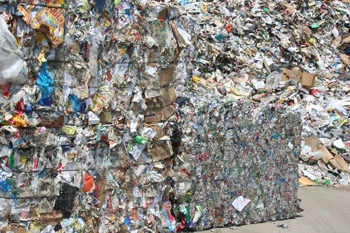
An audit performed on California’s Beverage Container Recycling Program has found a number of problems that are inhibiting the program’s success, according to the California State Auditor's office.
The California Beverage Container Recycling and Litter Reduction Act created the Beverage Container Recycling Program in 1986. The act requires beverage distributors to make a redemption payment to the Beverage Container Recycling Fund for every qualified beverage container sold or offered for sale in the state. The cost of the redemption payment is passed along to consumers when they purchase beverages. Consumers can return their used containers to recycling centers, receiving a payment representing the initial California refund value (CRV).
The Department of Resources Recycling and Recovery enforces the act, and its Division of Recycling administers the beverage program and the beverage fund. “However, because of deficiencies in its forecasting process, the department is not always able to reliably project the revenues and expenditures for the beverage fund,” according to a summary of the audit report, available at http://www.bsa.ca.gov/reports/summary/2010-101.
The California State Auditor’s office reports that it observed that during the past five fiscal years, the Resources Recycling and Recovery department’s forecasting model has produced results that differ by between 3 percent and 15 percent from the actual revenues and expenditures.
“Ineffective supervisory oversight and lack of review of the accuracy of the forecasts have also weakened the value of the forecasting model,” according to the summary, which goes on to note that the department’s forecasting errors resulted in a $158.1 million overstatement of the projected fund balance in the 2009-10 governor’s budget.
“Additionally, the actual balance in the beverage fund was understated in the governor’s budget for three fiscal years—2004-05 through 2006-07—because revenues were not corrected to include prior year adjustments,” the summary notes. The department reduced payments to program participants in response to a projected deficit in the fund’s balance in May 2009.
According to the summary, the department can more effectively manage the beverage program. “State law requires it to establish an auditing system to ensure that redemption payments that are made comply with the act,” the summary notes. “However, the department has not followed its plan to audit certain beverage distributors, and when audits are conducted, a significant lag exists between the audit’s completion and billing for identified underpayments.”
The auditor’s office noted two instances where the department exceeded the statute of limitations and lost the opportunity to collect a total of $324,000, and a third instance in which it did not complete an audit, potentially losing the opportunity to collect $431,000.
According to the summary, the department is failing in the area of fraud investigations of recyclers, as well, in part because it fails to document fraud leads it decides not to investigate. “Also, because the department does not have a systematic and documented methodology for analyzing data regarding the volume of recycled containers, it is potentially missing opportunities to detect fraud,” the report notes.
- Implementing a new forecasting model for the fiscal year 2011-12 governor’s budget;
- Placing appropriate controls over the forecast model; and
- Ensuring that the balances of the beverage fund in future governor’s budgets reflect actual revenues and expenditures from its accounting records.
- Tracking all fraud leads that the investigations unit receives and tracking the disposition of those leads as well as documenting the reasons for closing leads without an investigation; and
- Formalizing the approach used to analyze recycling data for potential fraud and developing criteria for staff to use when deciding whether to refer anomalies for investigation.
- Performing site visits to ensure that grantees are progressing on projects as expected;
- Requiring that grantees provide regular status reports describing their progress toward meeting the goals of the grant; and
- Scrutinizing the risks associated with proposed market development grants.

Explore the August 2010 Issue
Check out more from this issue and find your next story to read.
Latest from Recycling Today
- Alberta Ag-Plastic pilot program continues, expands with renewed funding
- ReMA urges open intra-North American scrap trade
- Axium awarded by regional organization
- China to introduce steel export quotas
- Thyssenkrupp idles capacity in Europe
- Phoenix Technologies closes Ohio rPET facility
- EPA selects 2 governments in Pennsylvania to receive recycling, waste grants
- NWRA Florida Chapter announces 2025 Legislative Champion Awards





